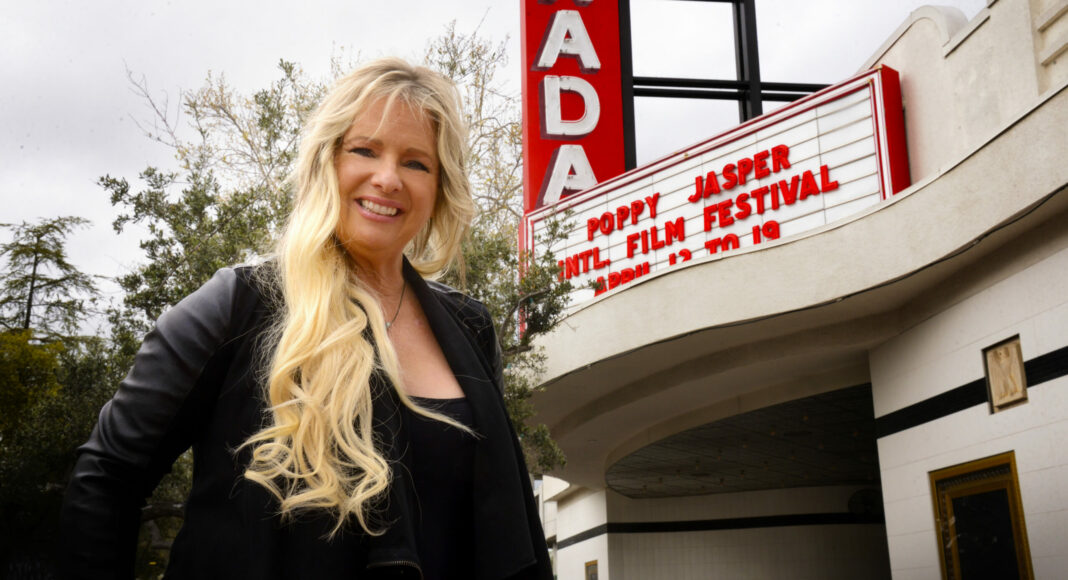Sometimes people ask Mattie Scariot if she is Poppy Jasper. She is not. She is, however, the director of the Poppy Jasper International Film Festival.
For one week each spring, PJIFF turns humble little Morgan Hill and the greater South County area into something of a cineaste’s retreat. Increasingly, it is becoming recognized for its role providing up-and-coming filmmakers an early shot. Last year, MovieMaker magazine included the fest in their list of 20 Great Film Festivals for First-Time Moviemakers.
This Wednesday, Poppy Jasper returns with 260 films from 30 different countries around the world, all screening across Morgan Hill, San Martin, Gilroy, Hollister and San Juan Bautista. The fest rolls out Wednesday with a student filmmaker day, then flickers through days themed around local filmmakers, women filmmakers, films from Mexico and LGBTQI+ films, culminating next Wednesday with a showcase of films from Iran.
Since 2018, Poppy Jasper has been run by Mattie Scariot. She is humble when describing her ascension to festival director.
“It was because nobody else wanted it,” she says with a laugh.
Poppy Jasper (named after a gemstone native to the Morgan Hill region) began in 2004 as a fundraiser for local public access station MHAT. Though the station didn’t survive, the festival quickly outlived its original goals, becoming a source of pride locally and a valuable opportunity for young filmmakers internationally.
Scariot first became involved with the fest as a volunteer in 2011. A lifelong film fan, as a kid, she had felt instantly transported to the far-off places displayed on the movie posters in her local rental store.
“I grew up in Gilroy pretty bored and had a wild imagination. Movies and music was a place you could just disappear,” she says. “I remember, 10 years old, seeing a movie poster, and I knew I didn’t want to be an actress, but I would look at all the names below and all the jobs there. I was always fascinated with that.”
When she became aware of the local festival in South County, she naturally volunteered. It seems her wild imagination hadn’t gone away. In the early days, she found her ideas were often at odds with management.
“I think my ideas were too big,” she says. “When I would talk about my ideas, I was told, that’s just not how we do things.”
That is, it wasn’t—up until a board meeting where the last remaining board member and treasurer both quit. Then, the festival was hers. Suddenly, there was no one to tell her her ideas were too big.
Since taking over, Scariot’s directorship has seen Poppy Jasper blossom. In 2016, attendance had dropped to only 300 people. In 2019, a year after she took over, it had grown to 3,000. Once funded with a purse of only $1,200, the festival now spans five cities, with Morgan Hill’s Granada Theatre as its homebase.
“I knew I needed the Granada,” Scariot says. “I needed to show people what this festival could look like, something that had a little more Hollywood to it.”
This year’s marquee films include Pinball: The Man Who Saved the Game, a biopic about the fateful single pinball shot that allows us to legally play pinball today, and Bolan’s Shoes, which explores the joys of glam rock and is directed by acclaimed Welsh actor Ian Puleston-Davies. Filmmaker Lane Michael Stanley, director of Addict Named Hal, which won last year’s Best Narrative Film award, returns this year with the short film Boifriend, about the complex ways parents sometimes only partially accept their gay and trans youth.
Included among this year’s list are works by filmmakers from San Jose, Salinas, Gilroy and Menlo Park. On Monday, the festival presents an Icon Award to producer/writer/designer Lupe Valdez, co-founder of Teatro Campesino, honoring her lifetime of contributions to film and stage.
Of course, recent years have provided no shortage of challenges for the humble fest. When the pandemic hit in 2020, it came just three weeks before screenings were supposed to begin. After some scrambling, Scariot managed to screen a fortnight of films online for the 2021 edition. Last year saw the fest return to physical theaters—and even had its highest-ever attendance rate of filmmakers, some 300 directors, writers, actors and cinematographers traveling to South County for the event.
“That’s why we’re here as a film festival, to lift up independent voices. I want to hear as many as I can.”
Through Apr 19



